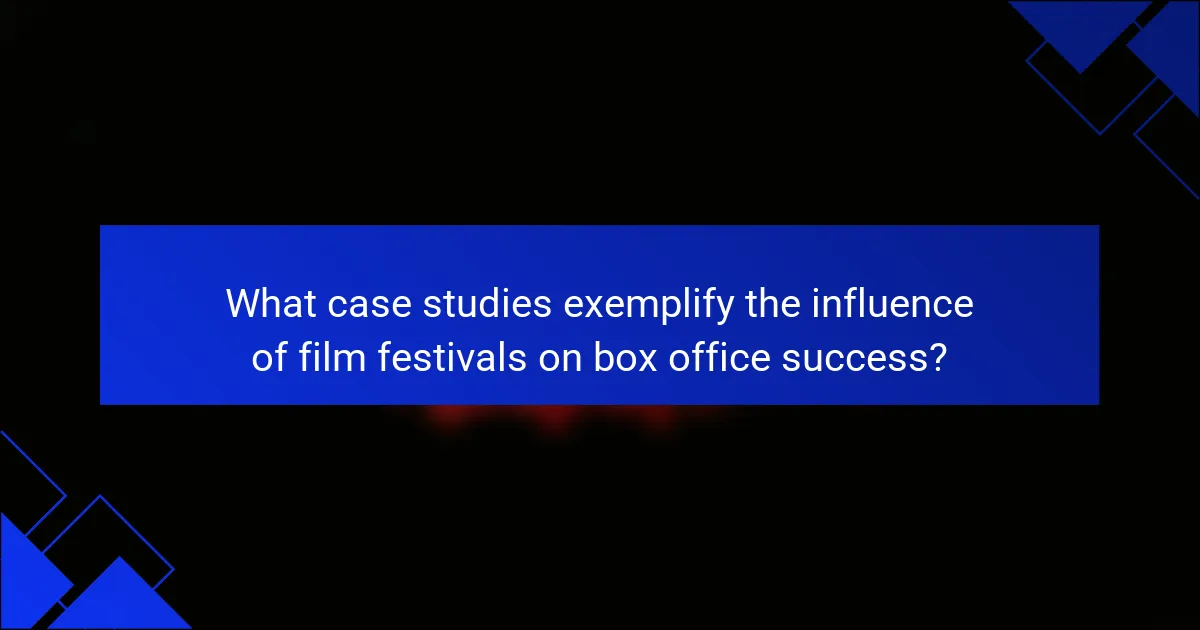
What is the influence of film festivals on box office success?
Film festivals significantly influence box office success by enhancing visibility and credibility for films. Winning or being featured in prestigious festivals increases audience interest. This recognition can lead to wider distribution deals and marketing opportunities. For example, films like “The King’s Speech” saw a box office boost after winning the Academy Award for Best Picture. Research indicates that films showcased at major festivals often outperform their peers in earnings. A study by the University of Southern California found that festival exposure correlates with higher box office revenue. Thus, film festivals play a crucial role in shaping a film’s commercial trajectory.
How do film festivals impact the visibility of award-winning films?
Film festivals significantly enhance the visibility of award-winning films. They provide a platform for filmmakers to showcase their work to industry professionals and audiences. Festivals attract media attention, leading to increased coverage of the films. This exposure can result in higher audience interest and attendance. Award-winning films often gain credibility through festival accolades. According to a study by the University of Southern California, films that win awards at major festivals see a 20% increase in box office revenue. Festivals also facilitate networking opportunities for filmmakers and distributors. This can lead to wider distribution deals and marketing support. Overall, film festivals play a crucial role in elevating the profiles of award-winning films.
What role do film festivals play in marketing and distribution?
Film festivals serve as critical platforms for marketing and distribution of films. They provide filmmakers with opportunities to showcase their work to industry professionals and audiences. Festivals often attract distributors looking for new content to acquire. Winning awards at festivals can enhance a film’s visibility and credibility. For example, films that win at prestigious festivals like Sundance or Cannes often see increased box office earnings. Festivals also facilitate networking among filmmakers, distributors, and potential investors. Additionally, they generate media coverage that can boost a film’s profile. The exposure gained can lead to broader distribution deals and international sales. Overall, film festivals play a vital role in shaping a film’s commercial journey.
How does festival selection affect audience perception?
Festival selection significantly influences audience perception by shaping expectations and emotional responses. Films showcased at prestigious festivals often gain credibility and prestige. This enhances audience anticipation and interest. Research shows that films winning awards or receiving nominations tend to perform better at the box office. For instance, the Academy Awards elevate a film’s visibility and perceived quality. Audiences often associate festival selection with artistic merit. This association can lead to increased ticket sales and viewership. Thus, the choice of festival plays a crucial role in how audiences perceive a film’s value and potential success.
Why are awards significant for box office performance?
Awards significantly enhance box office performance by increasing a film’s visibility and credibility. Winning or being nominated for prestigious awards attracts more viewers. Audiences often perceive award-winning films as higher quality. This perception leads to increased ticket sales. For instance, films that win Academy Awards can see box office boosts of up to 50% post-announcement. Awards also generate media coverage, further promoting the film. This heightened attention can lead to a longer theatrical run. Overall, awards serve as a powerful marketing tool that influences consumer behavior.
What types of awards can influence box office earnings?
Awards that can influence box office earnings include major film festival awards, industry awards, and audience choice awards. Major film festival awards, such as the Oscars, Cannes Film Festival awards, and Sundance Film Festival awards, often boost a film’s visibility. Winning or being nominated for these prestigious awards can lead to increased ticket sales. Industry awards like the Golden Globes and BAFTAs also enhance a film’s reputation. Audience choice awards, such as those from the Toronto International Film Festival, can drive public interest. Studies show that films with award nominations see a significant increase in box office revenue. For example, a study by the National Bureau of Economic Research found that Oscar nominations can increase box office revenue by up to 20%.
How do critical accolades from festivals affect ticket sales?
Critical accolades from festivals significantly boost ticket sales. Films that receive awards or positive reviews often attract more viewers. For example, a study by the University of Southern California found that films winning top festival awards can see a sales increase of 50% or more. Audience perception shifts positively when a film is recognized by prestigious festivals. This recognition enhances credibility and generates buzz in the market. Consequently, distributors are more likely to invest in marketing these films. The increased visibility leads to higher demand, resulting in greater box office earnings.

What are the key factors linking film festivals and box office success?
Film festivals significantly impact box office success through exposure, awards, and audience engagement. Exposure at festivals generates media coverage and buzz. This increased visibility can lead to higher ticket sales. Awards received at these festivals enhance a film’s credibility. Winning prestigious awards often correlates with increased audience interest. Audience engagement at festivals creates a loyal fan base. Enthusiastic festival attendees frequently promote films through word-of-mouth. Additionally, festival screenings provide valuable feedback, helping filmmakers refine their marketing strategies. Studies show that films winning major festival awards often see a substantial boost in box office earnings post-festival.
How do festival screenings affect a film’s release strategy?
Festival screenings significantly influence a film’s release strategy. These screenings often serve as a platform for generating buzz and attracting distributors. Films that perform well at festivals can secure theatrical distribution deals. For instance, the Sundance Film Festival has a history of launching films that later achieve box office success. Success at festivals can also lead to increased marketing budgets. Additionally, awards won at festivals can enhance a film’s visibility and credibility. This visibility often translates into higher audience interest upon release. Ultimately, festival screenings can dictate the timing and scale of a film’s release strategy.
What is the relationship between festival timing and box office results?
Festival timing significantly influences box office results. Films released during major festivals often see increased visibility and audience interest. This heightened attention can lead to higher box office earnings post-festival. For instance, films that win awards at festivals like Sundance or Cannes typically experience a surge in ticket sales. A study by the University of Southern California found that films premiered at festivals had a 30% higher box office gross compared to those that weren’t. Additionally, timing around festival dates can create strategic marketing opportunities. This relationship underscores the importance of festival timing in maximizing box office success.
How does audience engagement at festivals translate to box office success?
Audience engagement at festivals directly influences box office success. High audience engagement often leads to increased word-of-mouth promotion. Positive feedback from festival attendees can create buzz around a film. This buzz enhances visibility and interest among wider audiences. Research shows that films with strong festival screenings often see higher opening weekend earnings. For example, films that win awards at festivals typically experience a boost in ticket sales post-festival. Engaged audiences can also attract distributors, leading to wider releases. Overall, the connection between audience engagement and box office success is well-documented in industry studies.
What demographic trends are observed among festival audiences?
Festival audiences typically exhibit diverse demographic trends. Age distribution shows a significant presence of young adults, particularly those aged 18 to 34. This age group often seeks unique cultural experiences. Gender representation tends to be relatively balanced, with slight variations depending on the festival type. Ethnic diversity is also notable, reflecting broader societal demographics. Education levels among attendees are generally high, with many holding college degrees. Income levels vary, but many festival-goers have disposable income for entertainment. Geographic trends indicate that urban populations are more likely to attend festivals. These trends are supported by studies such as the “National Endowment for the Arts” report, which highlights the growing engagement of younger audiences in cultural events.
How do audience demographics influence box office outcomes?
Audience demographics significantly influence box office outcomes. Different age groups, genders, and cultural backgrounds affect movie preferences. For instance, younger audiences tend to favor action and fantasy genres. In contrast, older demographics often prefer dramas or documentaries. Gender also plays a role; women may be more inclined to watch romantic comedies, while men often gravitate towards thrillers.
Cultural backgrounds impact the types of stories that resonate with viewers. Films that reflect diverse experiences can attract larger audiences. According to a study by the Motion Picture Association, films with diverse casts perform better at the box office. This indicates that demographic representation can enhance appeal.
Additionally, audience demographics dictate marketing strategies. Targeted advertising can increase engagement and drive ticket sales. Understanding these factors helps studios optimize their films for specific audiences, ultimately influencing box office success.
What insights can be drawn from festival audience behavior?
Festival audience behavior provides insights into preferences and trends in film consumption. Audiences often favor films that resonate emotionally or socially. Their engagement can influence a film’s box office performance post-festival. For instance, films that receive audience awards tend to see increased ticket sales. Research shows that audience reactions at festivals can predict future success. A study by the University of Southern California found that films with high audience ratings at festivals often perform better commercially. Additionally, audience demographics can reveal market trends. Understanding these behaviors helps filmmakers and distributors strategize effectively.

What case studies exemplify the influence of film festivals on box office success?
“Moonlight” won the Best Picture Oscar after premiering at the Sundance Film Festival. Its box office gross exceeded $65 million. “The King’s Speech” also debuted at the Toronto International Film Festival. It earned over $400 million worldwide after winning multiple awards. “Lady Bird” premiered at the Telluride Film Festival. It grossed $79 million, significantly exceeding its budget. “The Shape of Water” showcased at the Venice Film Festival. It grossed $195 million globally after receiving critical acclaim. These case studies demonstrate that film festivals can significantly boost box office success through exposure and accolades.
Which award-winning films have seen significant box office success?
“Avatar” is an award-winning film that has seen significant box office success. It grossed over $2.8 billion worldwide, making it one of the highest-grossing films of all time. “Titanic,” another award-winning film, also achieved remarkable box office success, earning over $2.2 billion globally. “The Lord of the Rings: The Return of the King” won multiple Academy Awards and grossed over $1.1 billion. These films demonstrate a strong correlation between award recognition and box office performance.
What factors contributed to their commercial performance post-festival?
Award recognition significantly contributed to their commercial performance post-festival. Winning prestigious awards enhances a film’s visibility and credibility. This often leads to increased audience interest and ticket sales. Positive reviews from festival screenings can also boost a film’s reputation. Marketing strategies that leverage festival success can attract larger audiences. Distribution deals may be more favorable after a film’s festival success. Social media buzz generated during festivals can sustain interest long after the event. Overall, these factors collectively elevate a film’s box office earnings.
How did festival awards impact their marketing campaigns?
Festival awards significantly enhance marketing campaigns by increasing visibility and credibility. Winning or being nominated for prestigious awards attracts media attention. This media coverage amplifies the film’s reach to potential audiences. Awards also create a sense of prestige, which can influence audience perceptions. Films that receive accolades often see a boost in box office earnings. For instance, the 2020 Oscars saw films like “Parasite” experience a 234% increase in ticket sales post-win. Marketing strategies often highlight these awards in promotional materials. This approach leverages the award’s recognition to entice viewers. Overall, festival awards serve as powerful endorsements in competitive markets.
What lessons can filmmakers learn from successful festival strategies?
Filmmakers can learn several key lessons from successful festival strategies. First, targeting the right festivals can significantly enhance visibility. Major festivals like Sundance and Cannes attract industry attention and media coverage. Second, networking is crucial; filmmakers should engage with other creators, distributors, and potential collaborators. This can lead to valuable partnerships and distribution deals. Third, understanding the festival’s audience helps tailor the film’s marketing approach. Films that resonate with festival-goers often receive positive word-of-mouth, boosting their box office potential. Fourth, timing the release around festival screenings can capitalize on the buzz generated. Successful films often see increased earnings post-festival due to heightened interest. Finally, leveraging awards and nominations can enhance a film’s credibility and attract wider audiences. Films that win or are nominated for awards often experience a significant boost in box office performance, as evidenced by the success of films like “Moonlight,” which grossed over $65 million following its Academy Award win.
How can filmmakers leverage festival participation for future projects?
Filmmakers can leverage festival participation to enhance future projects by gaining visibility and networking opportunities. Festivals provide a platform to showcase films to industry professionals and audiences. This exposure can lead to distribution deals, funding opportunities, and collaborations. Networking at festivals allows filmmakers to connect with potential partners, investors, and mentors. Engaging with audiences can also provide valuable feedback for future projects. Additionally, winning awards at festivals can boost a film’s credibility and attract attention for subsequent works. Historical data shows that films with festival accolades often perform better at the box office. For instance, films like “Moonlight” and “The Shape of Water” gained significant box office success after festival recognition.
What best practices should filmmakers adopt for festival submissions?
Filmmakers should follow specific best practices for festival submissions. First, they must research festivals to find those that align with their film’s genre and themes. This ensures a better fit and increases the likelihood of acceptance. Next, filmmakers should adhere strictly to submission guidelines. Each festival has unique requirements regarding formats, lengths, and deadlines. Filmmakers must provide high-quality materials, including a polished film, engaging synopsis, and professional press kit. A compelling cover letter can also make a significant difference. Filmmakers should highlight unique selling points of their film and any previous accolades. Networking at festivals can also enhance visibility and future opportunities. According to the Sundance Institute, films that engage with festival audiences often see improved box office performance.
The main entity of this article is film festivals and their impact on box office success. The article examines how film festivals enhance visibility, credibility, and audience engagement for films, particularly award-winning ones, leading to increased box office earnings. It discusses key factors linking festivals to commercial performance, including exposure, marketing opportunities, and audience demographics. Additionally, it highlights case studies of successful films, demonstrating the correlation between festival accolades and box office results, while providing insights and best practices for filmmakers to leverage festival participation for future projects.
